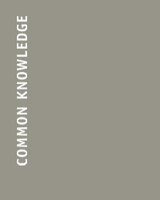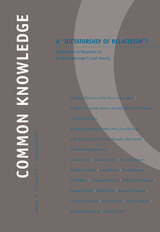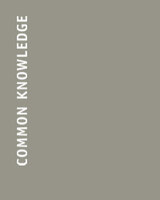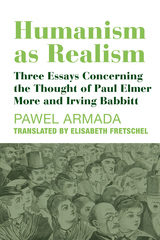
Described by the New York Times as one of two American journals in which public intellectuals and other scholars prefer to publish, the highly acclaimed Common Knowledge has returned to publication after a two-year hiatus. In an effort to place itself in the ferment of intellectual life and broaden its geographical range, the journal has moved to the Middle East, to Israel. Born in an attempt to moderate and get past the "culture wars" of the 90s, Common Knowledge has moved, literally, to a war zone, and accordingly its editorial interests have broadened to include culture wars of a less metaphorical kind.
Its mission is both incredibly ambitious and shockingly simple: to open up lines of communication between the academy and the community of thoughtful people outside its walls. Common Knowledge was created to form a new intellectual model, one based on conversation or cooperation rather than on metaphors adopted from sports and war, of "sides" that one must "take." The journal will collect work from a variety of fields and specialties, including philosophy, religion, psychology, literary criticism, cultural studies, art history, political science, and social, cultural, and intellectual history.
Scholars such as Richard Rorty, Bruno Latour, Clifford Geertz, Julia Kristeva, Karma Nabulsi, and J. G. A. Pocock will cross paths with political figures like Prince Hassan of Jordan and President Arpad Goncz of Hungary, novelists like Susan Sontag, poets like Yves Bonnefoy, composers like Alexander Goehr, and journalists like Adam Michnik. The pages of Common Knowledge are sure to challenge the ways we think about theory and its relevance to humanity. The first volume will feature the beginning of a Seriatim Symposium, “Disagreement, Enmity, and Dispute,” which will include discussions of the title concepts from a variety of theoretical perspectives. The Symposium asks why, in an intellectual context in which “true” and “real” are words that can be used only in condescending scare quotes, there is so much absolute conflict. If truth and reality are constructions, then why aren’t we constructing consensual orders (metaphysical and social) that are conducive to peace, calm, and cooperation?
Contributors for forthcoming issues include: Manfred Frank, Jacques Le Goff, Vicki Hearne, Sissela Bok, Edward Cardinal Cassidy, Linda Hutcheon, G. Thomas Tanselle, Arlette Farge, Marcel Detienne, Caryl Emerson, Stanley Katz, and Peter Laslett.

One essay relates the arguments of Ratzinger to those of two other German scholars—the conservative political theorist Ernst Wolfgang Böckenförde and the liberal philosopher and sociologist Jürgen Habermas—since all three men assume that social order depends on the existence of doctrinal authority (divine or otherwise). The contributors here argue for an intellectual and social life free of the desire for an “infantilizing” authority. One proposes that the Christian god is a relativist who prefers limitation and ambiguity; another, initially in agreement with Ratzinger about the danger relativism poses to faith and morals, then argues that this danger is what makes relativism valuable. The issue closes with the first English translation of an extract from a book on Catholic-Jewish relations by Cardinal Carlo Maria Martini, one of the Catholic Church’s most progressive figures.
Contributors. David Bloor, Daniel Boyarin, Mary Baine Campbell, Lorraine Daston, Arnold I. Davidson, John Forrester, Kenneth J. Gergen, Simon Goldhill, Jeffrey F. Hamburger, Julia Kristeva, Carlo Maria Cardinal Martini, Christopher Norris, Joseph Cardinal Ratzinger, Richard Shusterman, Barbara Herrnstein Smith, Jeffrey Stout, Gianni Vattimo

One contributor, a longtime president of the American Council of Learned Societies, calls for "intellectual philanthropy" and suggests that academics should transcend their ideological differences and form cooperative partnerships in the public service. A pair of essays, by key figures of the 1989 Velvet Revolution in Eastern Europe, analyze the ways that self-confidence and self-regard undercut efforts toward the resolution of complex social problems. The qualities of ideological self-subversion and even weakness, Common Knowledge maintains, are essential if the intellectual community is to become an agent for peace in a time of war.
Contributors. Wayne Andersen, Sissela Bok, Yves Bonnefoy, Caroline Walker Bynum, Clare Cavanagh, Charles-Albert Cingria, Caryl Emerson, Clifford Geertz, Stanley N. Katz, Aileen Kelly, Adam Michnik, Péter Nádas, Eugene Ostashevsky, Jeffrey M. Perl, Marjorie Perloff, Nina Pelikan Straus, Rei Terada, Gianni Vattimo, William Vesterman, Aleksandr Vvedensky, Adam Zagajewski.

Contributors. M. H. Abrams, Edward Albee, Barry Allen, Wayne Andersen, Kwame Anthony Appiah, Sir Isaiah Berlin, Marianna Birnbaum, Sir John Boardman, G. W. Bowersock, Aldo Buzzi, Caroline Walker Bynum, Anne Carson, William M. Chace, J. M. Coetzee, Cornelius Castoriadis, Stanley Cavell, Stuart Clark, Inga Clendinnen, Francis X. Clooney, Christopher Coker, Maria Conterno, Michael Cook, Lorraine Daston, Lydia Davis, Natalie Zemon Davis, Thibault De Meyer, Gunter Eich, Sir John H. Elliott, Caryl Emerson, Mikhail Epstein, Péter Esterházy, Roger Cardinal Etchegaray, Fang Lizhi, Paul Feyerabend, Michael Fried, Joseph Frank, Manfred Frank, Luis Garcia, Clifford Geertz, Carlo Ginzburg, Philip Gossett, Stephen Greenblatt, Thom Gunn, Jürgen Habermas, Ian Hacking, Václav Havel, Sir Edward Heath, Albert O. Hirschman, David Hollinger, Darrel Alejandro Holnes, Miroslav Holub, Maya Jasanoff, Albert R. Jonsen, Stanley N. Katz, Hugh Kenner, Sir Anthony Kenny, Sir Frank Kermode, Jee Leong Koh, Joseph Leo Koerner, Yusef Komunyakaa, György Konrád, Bruce Krajewski, László Krasznahorkai, Anton O. Kris, Julia Kristeva, Bruno Latour, Ewa Lipska, Greil Marcus, Steven Marcus, Samuel Menashe, Adam Michnik, Jack Miles, Alexander Nehamas, Reviel Netz, Sari Nusseibeh, Jeffrey M. Perl, Marjorie Perloff, J. G. A. Pocock, W. V. Quine, Belle Randall, Nadja Reissland, Colin Richmond, Richard Rorty, Ingrid Rowland, Hanna Segal, Amartya Sen, Quentin Skinner, Barbara Herrnstein Smith, A. L. Snijders, Timothy Snyder, Susan Sontag, Isabelle Stengers, Wis?awa Szymborska, Miguel Tamen, G. Thomas Tanselle, Sir Keith Thomas, Stephen Toulmin, Anna Lowenhaupt Tsing, Michiko Urita, Bas van Fraassen, Marina Vanzolini, Gianni Vattimo, Helen Vendler, Charlie Samua Veric, Eduardo Viveiros de Castro, Sir Bernard Williams, Lord (Rowan) Williams, H. R. Woudhuysen, Grzegorz Wróblewski, Santiago Zabala
READERS
Browse our collection.
PUBLISHERS
See BiblioVault's publisher services.
STUDENT SERVICES
Files for college accessibility offices.
UChicago Accessibility Resources
home | accessibility | search | about | contact us
BiblioVault ® 2001 - 2024
The University of Chicago Press









